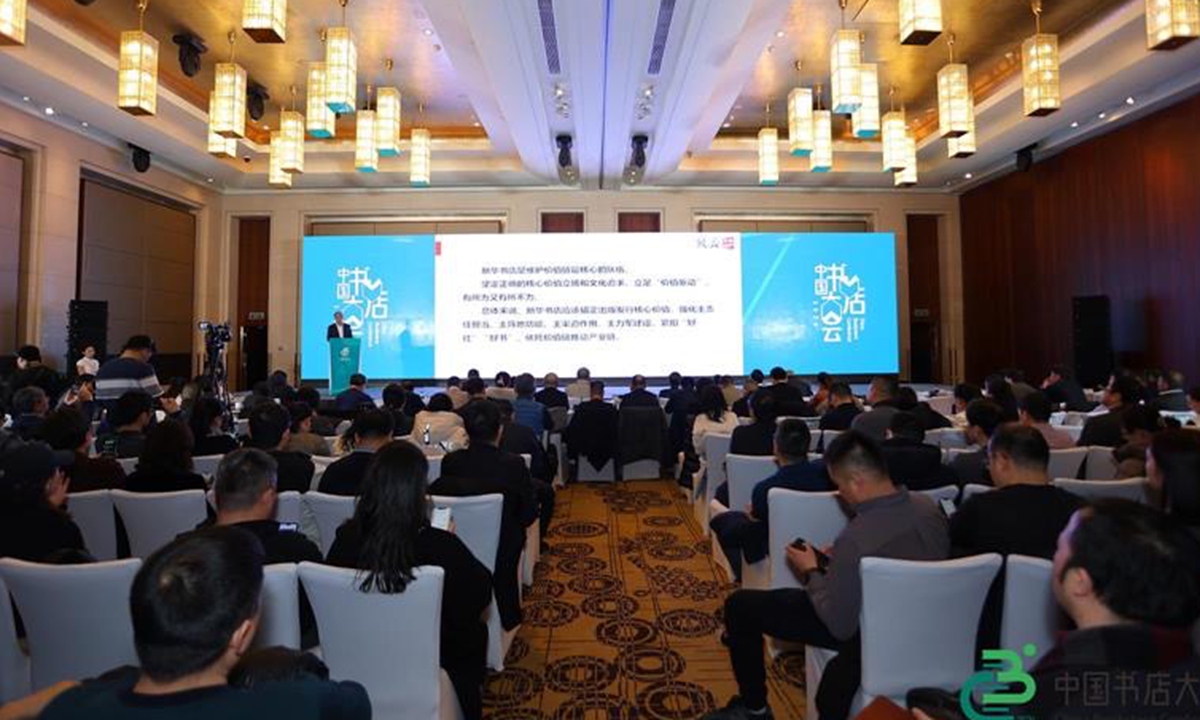
Librairie Avant-Garde bookstore in Nanjing, East China's Jiangsu Province Photo: VCG

The 2024 Chinese Bookstore Conference Photo: Courtesy of the conference
The 2024 Chinese Bookstore Conference, themed "Innovation, reshaping the value of bookstores," recently took place in Beijing, bringing together officials, industry insiders, and visionaries eager to explore the future of physical bookstores. Recognizing the challenges faced by traditional book retailers under the threat of internet channels, the conference emphasized the pivotal role of innovation in revitalizing these cultural hubs.
Dong Yiwei, Deputy Director of the Printing and Distribution Bureau of the Publicity Department of the Central Committee of the Communist Party of China (CPC), delivered a speech at the conference, noting the continued diversification of book retail channels. Dong highlighted the emergence of new channels and models, the problem of cheap and erratic book sales, and other challenges faced by physical bookstores. She emphasized the importance of innovation, transformation, and novel services in shaping the future of these cultural institutions.
Ai Limin, Director-General of the Books and Periodicals Distribution Association of China, told the Global Times on Tuesday that physical bookstores in 2023 were still in a process of recovery, with a 4.7 percent year-on-year growth in market sales. However, to return to the sales levels of 2019, more effective approaches are required.
Additionally, despite the closure of over 1,500 bookstores nationwide in the last three years due to the epidemic, the opening of over 1,200 new bookstores indicates overall stability. Ai attributed this achievement to the supportive national and local government policies, reflecting the national strategic development goal of building a culturally strong nation.
The Ministry of Finance and the State Taxation Administration issued a notice in 2023, to continue the implementation of preferential value-added tax policies for publicity and culture to run until December 31, 2027, according to the Xinhua News Agency.
Precise target contributes to innovationAccording to Ai, the emergence of newly opened bookstores with target customers bases and distinctive characteristics, backed by thorough market research, adds an interesting dimension to the evolving landscape.
Xinshan Bookstore, for instance, recognized as one of "China's most beautiful bookstores," has garnered numerous accolades such as "demonstration community aesthetic space" and an "urban-caring bookstore of the year."
According to its founder, Li Hui, the Xinshan Bookstore is tailored for women aged 25-40 who love reading, socializing, and embracing a healthy lifestyle. The focus on the booming "sheconomy" and the reshaping of the emotional value of the bookstore contribute to its uniqueness.
Xinshan Bookstore, designed by renowned architects, predominantly comprised of wood, features a playlist of vinyl music, a careful selection of high-quality books, and floral arrangements by a professional florist.
Li told the Global Times on Tuesday that despite the challenges posed by the impact of new internet information tools on traditional bookstores' user systems and values, the experiences of bookstores like Xinshan illustrate ongoing attempts at self-renewal and exploration, suggesting that physical bookstores do have a future, provided they adopt innovative perspectives beyond the traditional book-selling logic.
Hunzhi Bookstore in Shanghai, is the first offline bookstore to be founded by internet influencer "Hunzhi," who boasts 60 million followers and is known for transforming complex information into accessible and informative cartoons. The store not only offers a curated bibliography but also provides a creative space where visitors can witness live cartoon creation, design personalized avatars and engage in knowledge-sharing flash events.
Founder Chen Lei told the Global Times on Tuesday that the future of bookstores extends beyond mere commerce, as they serve as a reflection of urban culture and fulfill diverse cultural and promotional needs. He emphasized that for a bookstore opened by an author, "creation" is its calling card and soulful theme.
Hi-tech and culture lead to uniqueness Ai mentioned that many of the bookstores that closed in 2023 were those suffering from severe homogeneity, lacking innovation, or facing financial challenges, thereby losing their competitive edge. The emerging trend of advocating for unique and distinct styles for each bookstore is considered a forward thinking development.
As a traditional bookstore group in China, the Xinhua Bookstore is currently transitioning toward adopting unique styles for each of its outlets.
Jin Tao, an official with the Anhui Xinhua Distribution Group said at the conference that on January 28, the group will launch an IP brand image for the Xinhua Bookstore in Hefei, East China's Anhui Province, symbolizing academic excellence. This move aims to drive the transformation of bookstores from mere physical spaces to cultural hubs, achieving a new leap in development through a blend of offline and online strategies.
Ren Zhenmao, deputy general manager of the Henan Xinhua Bookstore Distribution Group in Central China's Henan Province, revealed that Henan Xinhua is focusing on exploring revolutionary culture, historical culture, and regional culture to transform Xinhua Bookstore outlets into experiential spaces showcasing these three cultural aspects.
The Kaifeng Book City in Kaifeng, also in Henan Province, blends the rich cultural heritage of the ancient capital with the Xinhua Bookstore brand, featuring a mural wall combining Thousands of Miles of Rivers and Mountains, a reputed painting from the Song Dynasty (960-1127) and books related to Yellow River culture, Henan culture, and Kaifeng culture, presenting the unique cultural temperament and connotations of the Kaifeng Xinhua Bookstore.
Industry insiders said that these examples underscore the importance of understanding and catering to specific target audiences, a strategy crucial for the survival and success of physical bookstores in the face of digital disruption.





